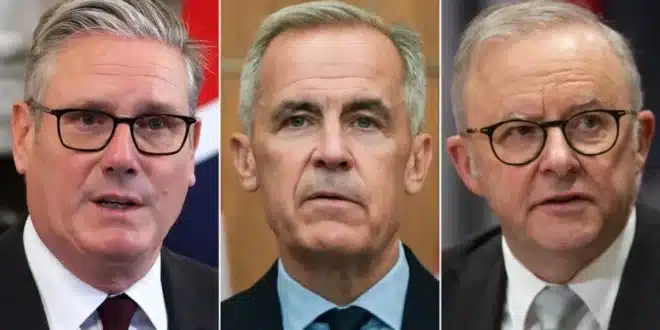In a significant diplomatic shift, Canada, Australia, and the United Kingdom formally recognized the state of Palestine today, marking a watershed moment in international efforts to push for peace in the Middle East. The decision comes amid Israel’s ongoing military campaign in Gaza, a conflict that has sparked widespread condemnation and intensified calls for a two-state solution.
Allies Break with Longstanding Policy
For decades, all three nations have been regarded as some of Israel’s closest allies, frequently aligning with Washington in supporting its policies across the region. Their recognition of Palestine signals both frustration with the deadlock in negotiations and growing dismay at the humanitarian toll of the war in Gaza.
In a joint statement, officials from the three countries stressed that their decision was motivated by the urgent need to revive the peace process. They cited the lack of progress toward a two-state solution as a driving factor, warning that continued stagnation could destabilize the wider region.
A Diplomatic Blow for Israel
This move leaves Israel increasingly isolated on the world stage. While the United States continues to oppose unilateral recognition of Palestine, the alignment of three major Western powers underscores a widening rift among Israel’s traditional allies. Analysts suggest the decision could embolden other nations—particularly in Europe and beyond—to follow suit.
The recognition also places additional pressure on Israeli leadership to alter its approach in Gaza. Despite mounting international outrage, Israel has pressed ahead with its campaign, insisting that its operations are necessary for national security. The acknowledgment of Palestine by three powerful allies, however, represents a direct challenge to that narrative.
Implications for the Path Ahead
While symbolic in some respects, today’s announcement may have far-reaching consequences. It bolsters Palestine’s case for broader international legitimacy and could influence upcoming debates at the United Nations, where momentum for recognition has been building.
For Canada, Australia, and the UK, the move is as much about principle as it is about geopolitics. By stepping out of lockstep with Washington, the three governments are betting that recognition can serve as leverage to restart serious negotiations, even as the situation on the ground grows more volatile.


